Having a bit of fun with yesterday's Face in the Plank got me thinking about all the times I've almost learned about how we recognise faces, and how this is so integral to being human. I worked with a man who couldn't really recognise faces, but self-absorbed twenty-something, I didn't think much of it at the time. He was indeed human, but had a few quirks to cope with his condition, as I'll explain shortly. Researching this piece sent me in scientific, literary and artistic directions which I'm bemused to report seem to have completely intertwined, which somehow seems metaphorical.
Let me start with the literary perspective, then wander through the artistic and scientific viewpoints as they mingle and merge with each other.
Looking "literarily"
The book that woke me to the phenomenon of not being able to recognise faces was "The Man Who Mistook His Wife for a Hat and Other Clinical Tales", by the neurologist Oliver Sacks.
Fans of Dr Sacks will know how compassionately he presented his patients' cases of strange neurological/neuropsychiatric phenomena. One of his best-known stories, the title case study in this book, is of a man who could not recognise faces, not even that of his wife. This might sound bizarre, but Sacks' telling of the man's experience is empathetic and humanising, as is his telling of his other patients' strange and unique lives.
You probably know who Oliver Sacks was. Some of you may remember him from the movie Awakenings, in which Robin Williams played him and Robert de Niro played one of the patients he brought back from catatonia. True story, sensitively told and brilliantly played by two of the best actors of our time. Oliver Sacks wrote the book Awakenings on which the film is based. Awakenings and The Man Who Mistook His Wife for a Hat are just two of the many brilliant books which Oliver Sacks gave us over the years, many helping us to explore the links between how our brains work, how we perceive our world, and how we relate to the people in our lives.
Now an artistic detour
The paperback cover of The Man Who Mistook His Wife for a Hat was striking.
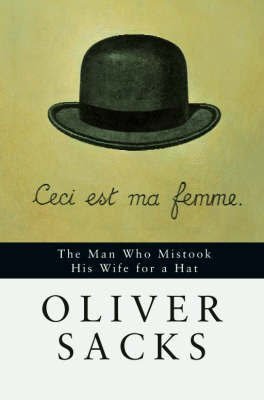
That text means "This is my wife."
For those of us who can see and recognise faces just fine, this idea of thinking a hat is a woman simply does not compute. Yet there are people who to some degree cannot distinguish between faces, or even between faces and objects, such as a hat.
But there was more to this cover illustration. So clever. A floating bowler hat, with a few words underneath. If you're an aficionado of René Magritte's work, and/or liked my post https://steemit.com/travel/@kiligirl/ceci-n-est-pas-un-tournevis-with-apologies-to-magritte, you'll have picked up on the modified-Magritte theme.
It plays on the images of faceless, or face-obscured, men which Magritte painted quite often. It was rare that a hat, if painted, was completely sans human. However, he did this on occasion, and so did the illustrator (darn, I would really have liked to have found out who that was). And in the case of the book cover, the illustrator wrote "Ceci est ma femme." Definitive. This is my wife, as opposed to "Ceci n'est pas une pipe" - this is not a pipe. Quite a profound piece of artwork in its own right, considering the book's title and related story.

I suspect The Son of Man and The Pilgrim were prime inspirations for the cover image.
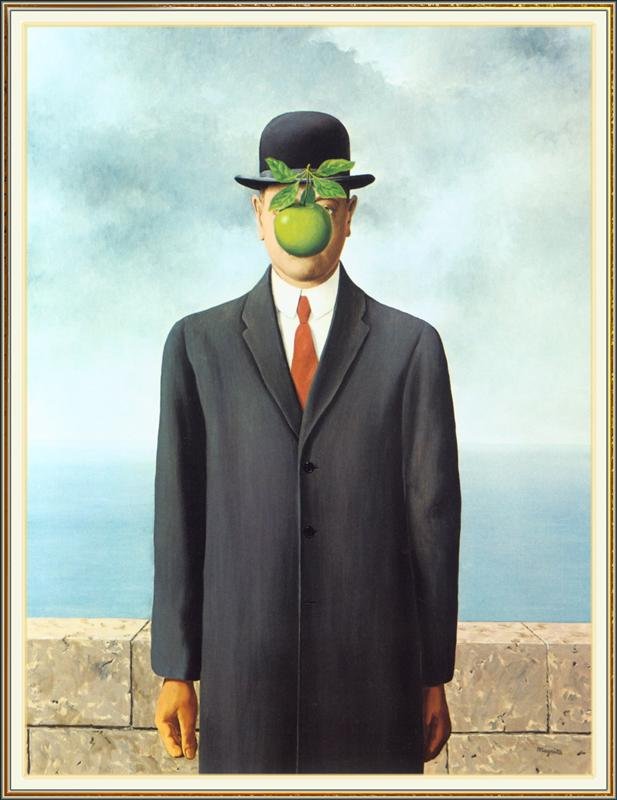
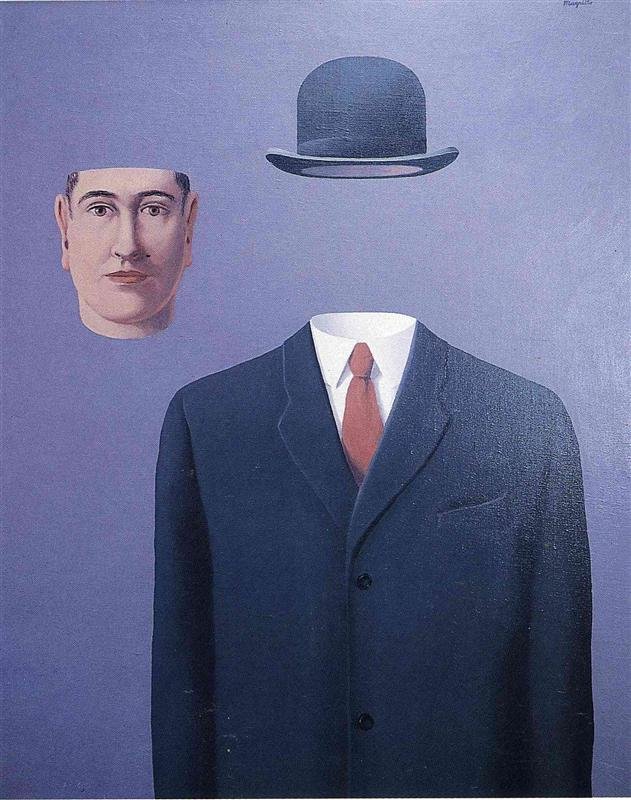
You can peruse Magritte's surrealist paintings at leisure here and here and draw your own conclusions.
We were on a literary tack, so back to the books
I did warn you the perspectives would mingle. I took you down an artistic rabbit hole; now it's time for a different kind of hole - Harry Hole (not even pronounced hole, but you'll have to chase down the Norwegian pronunciation yourselves).
Fans of detective novels have probably come across the Harry Hole series written by the dark, so dark Jo Nesbø. These novels give me a heckuva segue into the science part of this musing, as one of the main characters in the detective's team, Beate Lønn, has (well, had) a hyper-developed fusiform gyrus, which gave her an uncanny ability to remember faces. Forever. Which is ultimately the main reason for her demise (whoops, spoiler alert).
...and finally "sciencely"
So where does this capability to recognise and remember faces come from?
The Fusiform Gyrus
There's a part of our brain which processes faces. Really. You can learn more here and here. The fusiform gyrus is also involved in other perceptual activities, but it shines in the facial recognition department.
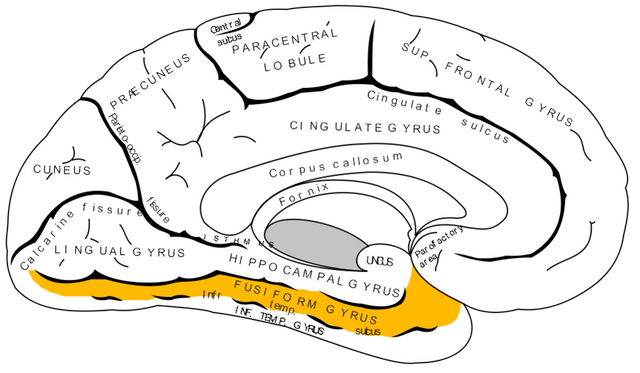
The Fusiform Face Area (FFA)
It even has its own sub-department dedicated to faces, the Fusiform Face Area, the light blue bits in the image below.
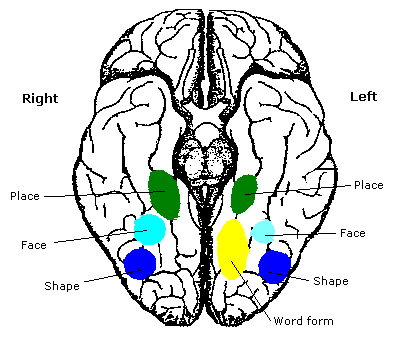
Honestly, I couldn't make up these names.
But what happens when the Fusi-team doesn't work properly?
Prosopagnosia (wow, heckuva word there...here's a great explanation of where it comes from and what it means), or face blindness, is one of the consequences.
I had a colleague in my early working days who used to tell me he could recognise me by my voice and my clothes that day. It was only after I read the Oliver Sacks book that I realised he also had a version of prosopagnosia....he coped tremendously well with it, and had no trouble sharing his coping mechanism. I regret I didn't pull the pieces together when we were working together, as it would have been really interesting to learn more from him.
And the kicker for me today
I thought I knew a lot about Oliver Sacks, but in this touchingly personal article in the New Yorker magazine, he also speaks candidly about his own lifelong challenges with prosopagnosia. The doctor who helped so many patients cope with face blindness and other neurological conditions which drastically changed the way they could see the world, and the faces around them, was also face blind.
Holy crap... I've never heard of face blindness, it's probably the strangest neurological condition to date. Thanks for this little journey of discovery into the unusual. Think I'll download this book. Cheers have a kiff day Linsey
Downvoting a post can decrease pending rewards and make it less visible. Common reasons:
Submit
What I've realised writing this is maybe I know someone now who has it to some degree, and has their coping mechanisms working well enough that they're functioning okay. A reminder to me to crank up the empathy motor....
Downvoting a post can decrease pending rewards and make it less visible. Common reasons:
Submit
This reminded me of another great article If the world was blind how many people would you impress?
Great post Linsey! I thoroughly enjoyed reading it. Followed and upvoted!
Downvoting a post can decrease pending rewards and make it less visible. Common reasons:
Submit
My goodness, @ugetfunded, that was such an inspiring piece - thank you so much for the comparison, and for sharing it. So glad you enjoyed my post 🤗.
Downvoting a post can decrease pending rewards and make it less visible. Common reasons:
Submit
I'm happy to know that you found it inspiring. I think it's based on a quotation from this guy
Keep 'em coming!
Downvoting a post can decrease pending rewards and make it less visible. Common reasons:
Submit
Interesting profile! How do you know about him? I'm Canadian, we share a birthday and I've done a bit of work in Ethiopia, which doesn't even count as coincidence, but it's cool for me.
I'm working on my phone at the moment, so maybe couldn't see it in the wiki article - will appreciate it if you could point me to the quote you mentioned 😊
Downvoting a post can decrease pending rewards and make it less visible. Common reasons:
Submit
I grew up in Vancouver BC and my favorite market has an employee that is famous is Canada for introducing herself to every patron and remembering their face and name. My mom told me about her experience there so I went with her to check it out. Sure enough when we went through the checkout line the woman's face lit up - she said "Katherine! This must be your daughter Julia!" - She had remembered my name before even seeing my face!! From that moment forward I was a permanent patron of the store (which felt sort of like a giant family) until I moved to the Bay Area. Sadly I don't remember this woman's name, but I certainly remember her face.
Downvoting a post can decrease pending rewards and make it less visible. Common reasons:
Submit
Amazing - like Nelson Mandela (and Brett Cane - perhaps more locally known than Madiba 😊). People who can do that make others feel so special! What a lovely story. Maybe she'll get to see it some day. Thanks so much for sharing!
Downvoting a post can decrease pending rewards and make it less visible. Common reasons:
Submit
I didn't realise people could suffer from 'face blindness;.
Truly fascinating to see how there is so much going on face recognition-wise and it all happens naturally without us even realising.
I guess if you do suffer from that, you are forced to identify other people from their voice or by how they look.
A really interesting post @kiligirl
Downvoting a post can decrease pending rewards and make it less visible. Common reasons:
Submit
I really wish I'd been more interested in my colleague back then. In retrospect, he must have had the most intricate ways of getting through his days. Imagine if we'd made it easier for him - what would he have been able to spend that extra energy on, if he hadn't had to cope with just figuring out who we were every day? Not feeling guilty, just wondering.
Downvoting a post can decrease pending rewards and make it less visible. Common reasons:
Submit
@kiligirl,
Wow that's an interesting article! I never heard about those books before and it made me little surprised as well. one of my uncle had this issue.. and there was no cure for him, at the end he couldn't recognized his only son and wife too. Finally he died... I wish I will read those books, at least I can understand the feeling that he had...
Thanks for sharing this amazing article! Really appreciate your effort!
Cheers~
Downvoting a post can decrease pending rewards and make it less visible. Common reasons:
Submit
Wow this goes deep, very nice! What I also think is funny is when people you know are very far away, too far too recognize their faces...but you can distinguise them by their own unique walk. I for one, am very good with faces and recognizing people I say years before once...which is also annoying sometimes. Like the other day I saw someone in a crowded area and I got recognized as well...but I just couldnt remember who they were...like name...how we met...just the face I recognized.
Downvoting a post can decrease pending rewards and make it less visible. Common reasons:
Submit
Such a complex field - your brain can remember faces from years ago, but not names. Fascinating how that must work. Thanks for sharing.
Downvoting a post can decrease pending rewards and make it less visible. Common reasons:
Submit
I'm usually also good with remembering names...but I guess only with people that left a certain impression on me. It's definitely a complex field!
Downvoting a post can decrease pending rewards and make it less visible. Common reasons:
Submit
🙂🙂
Downvoting a post can decrease pending rewards and make it less visible. Common reasons:
Submit
This is so cool to read. I had a student once so couldn't remember anyone. Even after years of working with him he would still ask "Who are you?" ever time we interacted
Downvoting a post can decrease pending rewards and make it less visible. Common reasons:
Submit
Glad you enjoyed it. Not our job to diagnose, but maybe that's what caused him to not recognise you....
Downvoting a post can decrease pending rewards and make it less visible. Common reasons:
Submit
Wow, what a fascinating look at prosopagnosia! Thank you for such an informative post. I can't even imagine trying to live with such a condition but I'm glad these folks have helpful resources.
Downvoting a post can decrease pending rewards and make it less visible. Common reasons:
Submit
Thank you for your kind words, @crystalize 😊
Downvoting a post can decrease pending rewards and make it less visible. Common reasons:
Submit
Oh, I loved Oliver Sacks' books - all the different stories! The butcher with short term memory loss, the old lady who heard nursery rhymes in her head and refused to be cured because it reminded her of her childhood. The man who kept throwing out his own leg out of the bed, and the other man who didn't notice how crooked he walked. It's amazing what happens in our brain (and what doesn't happen when small parts are not working...)
And Awakenings is of course my favorite movie of all times!! :)
I had no clue Oliver Sacks suffered from the same condition, but it seems fitting. Maybe that's why he was so motivated to research it, and so empathetic towards his patients.
Thanks so much for sharing, @kiligirl!
Downvoting a post can decrease pending rewards and make it less visible. Common reasons:
Submit
Indeed - the painter whose head injury left him unable to see colour, so he started painting in shades of grey (hundreds, not fifty ;-)); the fellow who only really came to life when listening to the Grateful Dead (do I have that right?); the surgeon/pilot with Tourette's syndrome, and major tics; the autistic abattoir designer whose autism made her the best darn abattoir designer around...all these people came alive for us as multidimensional people, not the sum total of their disability. And it was like a punch in the gut this afternoon to read that New Yorker article by Oliver Sacks in which he shares his own condition. I suppose it must have been well-known in Sacks fandom, but indeed, like you, I suspect that could have given him an extra special empathy towards his patients. Glad you enjoyed the post!
Downvoting a post can decrease pending rewards and make it less visible. Common reasons:
Submit
I will look up that article! :)
Downvoting a post can decrease pending rewards and make it less visible. Common reasons:
Submit
Woah never heard about something like face blindness ! What it would be like to never recognize faces... A whole different world/reality.
Downvoting a post can decrease pending rewards and make it less visible. Common reasons:
Submit
What was lovely reading the book was learning how people can turn their "disabilities" into truly different capabilities. Think I might read it again to remind me 😊
Downvoting a post can decrease pending rewards and make it less visible. Common reasons:
Submit
i know a person who forgets his road in the middle of the journey.
he then ask where I am going. He is a good driver.
Downvoting a post can decrease pending rewards and make it less visible. Common reasons:
Submit
Informative post mam :)
Downvoting a post can decrease pending rewards and make it less visible. Common reasons:
Submit
😊
Downvoting a post can decrease pending rewards and make it less visible. Common reasons:
Submit
Nice one
Downvoting a post can decrease pending rewards and make it less visible. Common reasons:
Submit
😊
Downvoting a post can decrease pending rewards and make it less visible. Common reasons:
Submit
Very nice,just wow.
Read my new article, a short love story.If u like it,do upvote.:)
https://steemit.com/love/@dipu57dip/the-girl-who-made-everyone-happy-with-her-smile
please follow me for more updates.
Downvoting a post can decrease pending rewards and make it less visible. Common reasons:
Submit
This is new to me. Very interesting post.
Downvoting a post can decrease pending rewards and make it less visible. Common reasons:
Submit
😊
Downvoting a post can decrease pending rewards and make it less visible. Common reasons:
Submit
awesome........very informative. thanks for it.
upvoted you
Downvoting a post can decrease pending rewards and make it less visible. Common reasons:
Submit
😊
Downvoting a post can decrease pending rewards and make it less visible. Common reasons:
Submit
too much information in this post i guess my brain is smarter now great post.
Downvoting a post can decrease pending rewards and make it less visible. Common reasons:
Submit
Hee hee...glad you enjoyed it. Wonder which part of your brain lit up when you read it!
Downvoting a post can decrease pending rewards and make it less visible. Common reasons:
Submit
There are so many things that we don't understand about the brain. Remembering "The Awakening" but apparently wasn't putting 2+2 together. That is until reading your post. Aha! 🐓🐓
Downvoting a post can decrease pending rewards and make it less visible. Common reasons:
Submit
Glad to be of service, ma'am >curtsies<
Downvoting a post can decrease pending rewards and make it less visible. Common reasons:
Submit